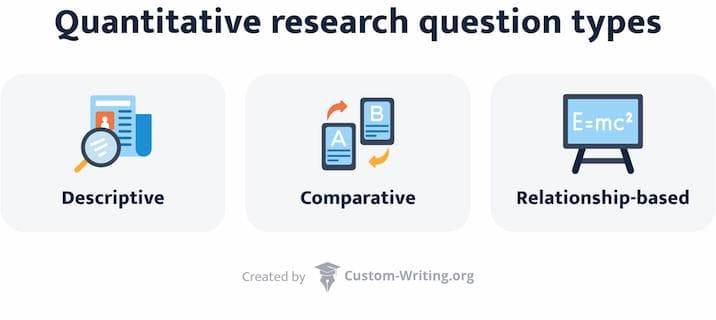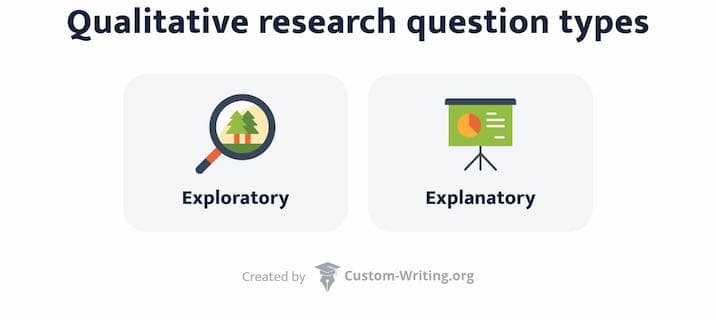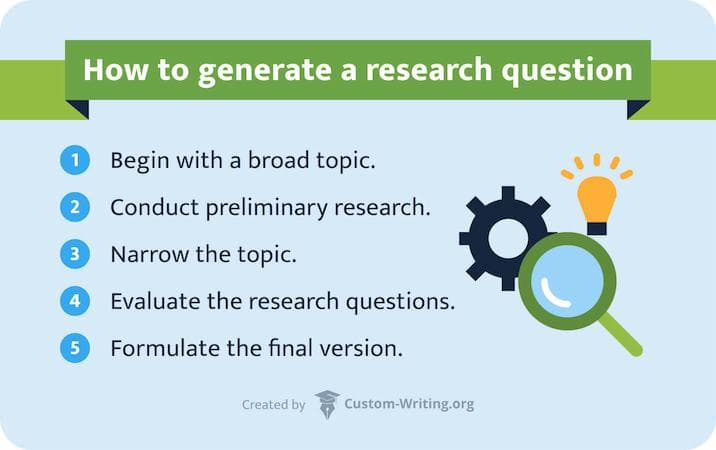Research Question Generator Online
Are you looking for effective aid in research question formulation? Try our research question generator and get ideas for any project instantly.
🤖 How to Use a Research Question Generator?
Struggling to develop a good research question for your college essay, proposal, or dissertation? Don't waste time anymore, as our research question generator is available online for free.
Our tool is designed to provide original questions to suit any subject discipline.
Generate your questions in a few easy steps as shown below:
- Add your research group and the influencing factor.
- Indicate your dependent variable (the thing you’re planning to measure).
- Add the optional parameters (the second research group and the time frame).
- Look at the examples if necessary.
Once you get the initial results, you can still refine the questions to get relevant and practical research questions for your project.
❗ Why Is a Research Question Important?
The main importance of formulating a research question is to break down a broad topic and narrow it to a specific field of investigation. It helps you derive a practical knowledge of the topic of interest. The research question also acts as a guiding structure for the entire investigation from paragraph to paragraph. Besides, you can define research issues and spot gaps in the study.
The research questions disclose the boundaries and limitations of your research, ensuring it is consistent and relevant. Ultimately, these questions will directly affect the research methods you will use to collect and analyze data. They also affect the process of generating a thesis statement. With a checker proposal, you can also polish your research question to ensure it aligns with the research purpose.
🔖 Research Question Types & Examples
The research writing process covers different types of questions, depending on the depth of study and subject matter. It is important to know the kind of research you want to do; it will help you in the formulation of an effective research question. You can select quantitative, qualitative, or mixed methods studies to develop your questions.
Let us explore some of these question types in detail to help you choose a workable option for your project:
Quantitative Research Questions
Quantitative questions are specific and objective, providing detailed information about a particular research topic. The data you collect from this research type is quantifiable and can be studied using figures.
These questions also delineate a relationship between the research design and the research question.
Quantitative questions focus on issues like:
- "How much"
- "How often"
- "How intense"
- "Is there a statistical relationship"
They illustrate the response with numbers.
In addition, quantitative questions help you to explore existing patterns in data from a specific location or context. The collected information allows researchers to make logical and data-driven conclusions.
This type of research question can be classified further into 3 categories.

Descriptive Research Questions
Such questions seek to describe a quantifiable problem and investigate the numbers, rates, or intensity of the issue. They are usually used to write descriptive papers.
Comparative Research Questions
As the name suggests, comparative questions intend to compare and contrast two or more issues in a research project. These questions are used in comparative papers. To formulate such a question, identify two or more variables, choose a standard for comparison, and present an in-depth discussion.
Let's look at a few examples.
Relationship-based Research Questions
Relationship-based questions reveal and identify a connection between two or more research variables. Such questions entail a dependent variable, an independent variable, and a socio-demographic of the population you are interested in studying.
Qualitative Research Questions
Qualitative research questions are open-ended and aim to explore or explain respondents' subjective meanings and experiences. You can't measure the data you collect from a qualitative research question in figures, as it's mostly narrative. Some of the common types include those described below.

Exploratory Research Questions
These questions investigate a particular research topic without any assumptions.
Explanatory Research Questions
These questions examine the reasons and find connections between existing entities.
Mixed Methods Studies
When you combine quantitative and qualitative research questions, you will get a mixed-method research study. It answers your research question more comprehensively since it combines the advantages of both research methods in a pragmatic study.
This mixed study can focus on quantitative data (score comparison with attitude ranking) and qualitative insights from student interviews about attitudes.
🗺️ How to Generate a Research Question?
We have outlined a few steps to generate exceptional questions for students who don't know how to write them effectively.

| Begin with a broad topic | The first step entails generating a broad topic to give you many avenues of exploration. You can conduct a brainstorming or mind-mapping session to identify relevant topics for your research project. Remember to focus on a subject you are interested in to arrive at a good research question faster. |
|---|---|
| Conduct preliminary research | After getting a topic, do preliminary research to uncover current issues in your academic field. This step also allows you to identify limitations and knowledge gaps related to your topic. These aspects could help you refine the research question later on. |
| Narrow the topic | Once you collect enough information about your topic of interest, you can start narrowing down the topic from a general into a more focused area of investigation. You can use the gaps you have identified at the research stage to formulate workable research questions. |
| Evaluate the research question |
This step entails evaluating the research questions you have formulated. Not all the questions will be viable. Thus, you should carry out a thorough assessment to find effective questions. Here are the key parameters of a winning research question:
|
| Formulate your final version | Finally, structure your research question properly within the required academic parameters. For instance, you should base your question on a specific problem, the subject, and the time frame. |
👀 More Research Question Examples
- Why do minorities delay going to the doctor?
- What makes humans mortal genetically?
- Why and how did the US get involved in the Korean War?
- The virus COVID-19: what went wrong?
- What is cancel culture, and can it go too far?
- How do human infants acquire a language?
- Eastern vs. Western religions: what’s the difference?
- Why is capitalism better than socialism?
- What do Hamlet and Oedipus have in common?
- How does language influence our world?
- Competence for nurses: why is it important?
- COVID-19 pandemic: what we can learn from the past?
❓ Research Question Generator FAQ
You should select an interesting topic related to the subject you are studying. Carry out preliminary research with our research question generator online and pick the question from the list of offered suggestions. Refine the question until you are satisfied with the result.
An effective research question should focus on a single issue and clearly state the research direction you will take. The topic should neither be too broad nor too narrow – just enough to keep you focused on the main scope of the study. Also, it should be answerable with a comprehensive analysis.
In an academic article, the research question is usually placed at the end of the introduction, right before the literature review. At times, it may be included in the methods section – after the review of academic research.
Identify what claim you want to make in your research purpose. Choose a dependent variable, an independent variable, and a target population, and formulate the assumed relationship between the variables for that respondent group. Ensure the data you collect is measured within a specific context.
